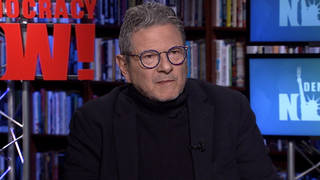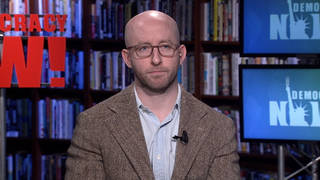Hi there,
As Democracy Now! turns 29 this month, the need for independent news questioning and challenging those in power is more critical now than ever. Although this is a period of great uncertainty for news organizations like ours, we are unwavering in our commitment to continue to bring you fearless trustworthy reporting on the issues that matter most. If our journalism is important to you, please donate today in honor of our 29th anniversary. Every dollar makes a difference. Thank you so much.
Democracy Now!
Amy Goodman
Hi there,
As Democracy Now! turns 29 this month, the need for independent news questioning and challenging those in power is more critical now than ever. Although this is a period of great uncertainty for news organizations like ours, we are unwavering in our commitment to continue to bring you fearless trustworthy reporting on the issues that matter most. If our journalism is important to you, please donate today in honor of our 29th anniversary. Every dollar makes a difference. Thank you so much.
Democracy Now!
Amy Goodman
Non-commercial news needs your support.
We rely on contributions from you, our viewers and listeners to do our work. If you visit us daily or weekly or even just once a month, now is a great time to make your monthly contribution.
Please do your part today.
HeadlinesMarch 17, 2016
Obama Names Merrick Garland as Nominee to Supreme Court
After weeks of speculation, President Obama has announced his nominee to replace the late Justice Antonin Scalia on the Supreme Court. Merrick Garland is the chief judge for the U.S. Court of Appeals for the D.C. Circuit. He is widely viewed as a moderate judge, who has received overwhelming bipartisan support in the past. He is most well known for overseeing the investigation and prosecution of Oklahoma City bomber Timothy McVeigh. Republicans have vowed to block the nomination of Merrick Garland. Senate Majority Leader Mitch McConnell said the Senate will wait until a new president is in place next January before even holding a hearing on a nominee. With the death of Antonin Scalia, the nine-member Supreme Court is now evenly split with four liberals and four conservative justices. Garland could tilt the court to the left for the first time in decades, though some on the left are concerned that his record on progressive issues is unclear. We’ll have more on the Supreme Court nomination after headlines.
Trump Claims There Will Be Riots If He’s Not Named GOP Nominee
In news from the campaign trail, Republican front-runner Donald Trump has claimed in an interview with CNN that there would be riots if he is not nominated to be the party’s candidate at the Republican convention this summer.
Donald Trump: “I think we’ll win before getting to the convention. But I can tell you, if we didn’t and if we’re 20 votes short or if we’re—if we’re, you know, a hundred short, and we’re at 1,100 and somebody else is at 500 or 400—because we’re way ahead of everybody—I don’t think you can say that we don’t get it automatically. I think it would be—I think you’d have riots. I think you’d have riots.”
Trump currently has 673 delegates—the most of any Republican candidate. He needs to secure 1,237 delegates to win the nomination outright. This comes as a British research organization has ranked the possibility of a Donald Trump presidency as one of the top 10 risks facing the world. The Economist Intelligence Unit ranked a Trump presidency as just as much of a global threat as the possibility that jihadi terrorism could destabilize the global economy.
Honduras: Another Indigenous Organizer with COPINH Murdered
In Honduras, another indigenous environmental activist has been murdered—less than two weeks after the assassination of famed environmental organizer Berta Cáceres. Thirty-eight-year-old Nelson García was a member of the group COPINH, the Civic Council of Popular and Indigenous Organizations of Honduras, which Berta Cáceres co-founded 22 years ago. He was shot in the face and killed by gunmen on Tuesday in Rio Lindo, about 100 miles south of La Esperanza, where Cáceres was murdered on March 3.
Syria: Russia Continues Withdrawing Air Force
Russia is continuing to withdraw its air force from Syria, following Russian President Vladimir Putin’s announcement Monday that Russia would be ending the five-month bombing campaign. A Reuters analysis estimates that Russia has already withdrawn just under half the jets it had stationed at a base in eastern Syria. The U.S.-led coalition, meanwhile, has continued to launch airstrikes against ISIL inside Syria.
Syrian Kurds Declare Semi-Autonomous Region in North
This comes as the Syrian Kurds have declared a semi-autonomous federal region in northern Syria, as the group pushes for self-administration under a future decentralized government. The announcement comes in the midst of U.N.-sponsored peace negotiations in Geneva. The Syrian Kurds have been excluded from the talks.
Turkey: Kurdish Group Claims Responsibility for Sunday Bombing
Meanwhile, in Turkey, a breakaway faction of the Kurdistan Workers’ Party has claimed responsibility for Sunday’s car bombing in Ankara, which killed 37 people. The faction, the Kurdistan Freedom Hawks, said the attack was in retaliation for Turkish military crackdowns in the majority Kurdish communities in the southeast.
Nigeria: Bombings Kill 22 in Borno State
In Nigeria, two suicide bomb attacks killed 22 people Wednesday at a mosque in the northeastern Borno state. The Nigerian military says the attack was carried out by two female suicide bombers. It struck the mosque during morning prayers. No one has claimed responsibility for the attack, but Borno state has been the center of attacks by Boko Haram in recent months.
Qatar: Poet Jailed for Arab Spring-Inspired Poem Freed
In Qatar, a prominent poet has been pardoned and released from prison after serving more than three years for writing and reciting a poem inspired by the Arab Spring. Rashid al-Ajami was jailed in November 2011 after a video surfaced of him reading a poem entitled “Tunisian Jasmine,” which celebrated Tunisia’s popular uprising. He was charged with insulting Qatar’s ruling emir and “inciting to overthrow the ruling system.”
Brazil: Rousseff Appoints Lula to Cabinet; Judge Releases Taped Calls
In Brazil, President Dilma Rousseff has appointed her predecessor Luiz Inácio Lula da Silva to be her chief of staff, in what she says is an effort to strengthen her government. A judge then released secretly recorded phone calls between Rousseff and Lula da Silva, which members of the opposition say demonstrate the appointment was actually intended to shield Lula da Silva from prosecution on corruption charges. Rousseff is currently facing impeachment proceedings. The political turmoil has sparked massive protests across Brazil.
Texas: Police Officer Arrested for Murder After Killing 16-Year-Old
In Texas, an off-duty suburban Dallas police officer has been arrested on charges of murder after fatally shooting 16-year-old Jose Raul Cruz on Sunday night. Authorities say officer Ken Johnson was off duty when he thought he saw a car being burglarized in the parking lot of his apartment complex. This set off a car chase, which ended with Officer Johnson killing Cruz and shooting another teenager, Edgar Rodríguez, in the head. Rodríguez survived. Authorities have not said whether either of the teenagers were armed.
University of Puerto Rico Student Shut Down Continues
The University of Puerto Rico remains shut down amid a three-day student strike in protest of austerity cuts. Student activist Gabriel Casal Nazario spoke at one of the university’s blocked entrances.
Gabriel Casal Nazario: “Students, we decided to shut down university, in a general assembly we held the 15th, Tuesday 15th, in a historic assembly, where there were more than 4,000 students, and we filled more than 13 amphitheaters. We decided that it is necessary to shut down the university, because in the past five years they have cut more than $542 million from our budget, and it’s affecting us. Every semester there’s less classes, there’s less professors. And we students have decided to take a stand.”
UC Davis Students Stage Sit-in to Demand Chancellor Resign
Meanwhile, at the University of California, Davis, a student sit-in outside the chancellor’s office is entering its sixth day. The students are demanding Chancellor Linda Katehi resign over her involvement with private corporate boards, including the for-profit college DeVry University, the expensive textbook maker Wiley & Sons and the controversial Saudi school King Abdulaziz University, which has been accused of paying for affiliations with top professors in efforts to boost its global rankings. Protesting graduate student Brandon Buchanan spoke from the sit-in.
Brandon Buchanan: “We, the occupiers of Mrak Hall, call for the resignation and/or firing of Linda B. Katehi, our chancellor. This chancellor has proven time and time again, from DeVry University to King Abdulaziz University to Wiley & Sons textbook co., that she doesn’t make decisions based on student interests. This isn’t new for her. This is old hat. She has a long history, dating back to 2011 with the pepper-spray incident, of putting her own interests over the interests of students.”
NYPD: Prison Reform Advocates Five Mualimm-ak and Others Arrested
And in New York City, prison reform activist Five Mualimm-ak has been released from jail after he and a fellow activist Joseph “Jazz” Hayden were arrested while attempting to mediate a police confrontation with a homeless man on Tuesday. The arrest came only moments after Mualimm-ak and Hayden left a book launch event, where Mualimm-ak had read his essay “Hell is a Very Small Place,” about his five years in solitary confinement. Mualimm-ak spoke after being released Wednesday night.
Five Mualimm-ak: “I have just been released after being incarcerated for a day or two, after a big event that we had at Soros Foundation. The other night, we had a big book launch, 'Hell is a Very Small Space,' with Solitary Watch and Soros Foundation, and when we came outside, Joseph 'Jazz' Hayden, who is the founder of Incarcerated Nation Corporation, our collective of projects, was videotaping an arrest of an emotionally disturbed person. And I felt committed because I’m on the mayor’s behavioral health task force, and we’ve created a system to basically avoid the occurrences that a person has going through the system. There’s a special way to treat people with emotional disturbances that was not being respected that night. Jazz being arrested, I stepped in, to not intervene but to try to mediate the problem, and was arrested, accosted, assaulted, as well, injured to the point that I’m getting medical attention. And we will be defending charges that are placed against us.”
To see our extended interview with Five Mualimm-ak and Jazz Hayden after the release from prison, go to democracynow.org.
Most popular
- 1
- 2
- 3
- 4
Non-commercial news needs your support
Please do your part today.











Media Options